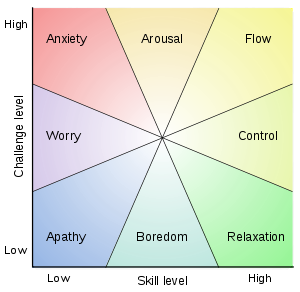- Mastery learning
-
Mental state in terms of challenge level and skill level, according to Csikszentmihalyi.[1] (Click on a fragment of the image to go to the appropriate article)

Mastery Learning is an instructional method that presumes all children can learn if they are provided with the appropriate learning conditions. Specifically, mastery learning is a method whereby students are not advanced to a subsequent learning objective until they demonstrate proficiency with the current one.
Mastery learning curricula generally consist of discrete topics which all students begin together. Students who do not satisfactorily complete a topic are given additional instruction until they succeed. Students who master the topic early engage in enrichment activities until the entire class can progress together. Mastery learning includes many elements of successful tutoring and the independent functionality seen in high-end students. In a mastery learning environment, the teacher directs a variety of group-based instructional techniques, with frequent and specific feedback by using diagnostic, formative tests, as well as regularly correcting mistakes students make along their learning path.
Teachers evaluate students with criterion-referenced tests rather than norm-referenced tests.
Mastery learning has nothing to do with content, merely on the process of mastering it, and is based on Benjamin Bloom's Mastery for Learning model, with refinements made by Block. Mastery learning may be implemented as teacher-paced group instruction, one-to-one tutoring, or self-paced learning with programmed materials. It may involve direct teacher instruction, cooperation with classmates, or independent learning. It requires well-defined learning objectives organized into smaller, sequentially organized units. Individualized instruction has some elements in common with mastery learning, although it dispenses with group activities in favor of allowing more able or more motivated students to progress ahead of others and maximizing teacher interaction with those students who need the most assistance.
Most experiments that compared mastery learning to conventional instruction have shown that mastery learning is more effective. In one meta-analysis (Kulik, Kulik & Bangert-Drowns, 1990), the mean effect size (Cohen's d) of 103 studies was 0.52 standard deviation units, which is considered a moderately large effect size.
The concept of mastery learning can be attributed to the behaviorism principles of operant conditioning. According to operant conditioning theory, learning occurs when an association is formed between a stimulus and response (Skinner, 1984). In line with the behavior theory, mastery learning focuses on overt behaviors that can be observed and measured (Baum, 2005). The material that will be taught to mastery is broken down into small discrete lessons that follow a logical progression. In order to demonstrate mastery over each lesson, students must be able to overtly show evidence of understanding of the material before moving to the next lesson (Anderson, 2000).
In general, mastery learning programs have been shown to lead to higher achievement in all students as compared to more traditional forms of teaching (Anderson, 2000; Gusky & Gates, 1986). Despite the empirical evidence, many mastery programs in schools have been replaced by more traditional forms of instruction due to the level of commitment required by the teacher and the difficulty in managing the classroom when each student is following an individual course of learning (Anderson, 2000; Grittner, 1975).
See also
- Benjamin Bloom
- Taxonomy of education objectives
- Instructional design
References
- ^ Csikszentmihalyi, M., Finding Flow, 1997.
Anderson, J. R. (2000). Learning and memory: An integrated approach (2nd ed.). New York: John Wiley and Sons, Inc.
Baum, W. M. (2005). Understanding Behaviorism: Behavior, Culture and Evolution. Malden, MA: Blackwell Publishing.
Block, Schools, Society and Mastery Learning. ISBN 978-0030884078
Kulik, C., Kulik, J., & Bangert-Drowns, R. (1990). Effectiveness of mastery learning programs: A meta-analysis. Review of Educational Research, 60(2), 265-306.
Grittner, F. M. (1975). Individualized instruction: An historical perspective. The Modern Language Journal, 323 333.
Gusky, T. R., & Gates, S. (1986). Synthesis of research on the effects of mastery learning in elementary and secondary classrooms. Educational Leadership, 43, 73-80.
Skinner, B. F. (1984). The evolution of behavior. Journal of Experimental Analysis of Behavior, 41, 217-221.
Categories:- Education theory
- Education stubs
Wikimedia Foundation. 2010.

